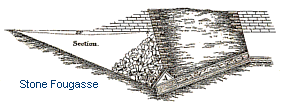 Fougasses were obstacles designed to throw an attacking
body of troops into confusion as it approached the crest of the counterscarp
of a fortification by the explosion of hidden charges of powder or artillery
shells. A plain fougasse consisted of a small charge of powder placed at
the bottom of a shaft sunken about one foot underground. Plain fougasses
were placed in rows near the crest of counterscarp and fired though a powder
hose buried about six inches underground. Shell fougasses consisted Fougasses were obstacles designed to throw an attacking
body of troops into confusion as it approached the crest of the counterscarp
of a fortification by the explosion of hidden charges of powder or artillery
shells. A plain fougasse consisted of a small charge of powder placed at
the bottom of a shaft sunken about one foot underground. Plain fougasses
were placed in rows near the crest of counterscarp and fired though a powder
hose buried about six inches underground. Shell fougasses consisted
 of one or more large calibre artillery shells placed in a box
and arranged with a detonating mechanism that either operated by friction,
pressure, or was fired by a powder hose. Stone fougasses were constructed
by excavating a trench or pit with one side cut at a 45° angle toward
the direction of the attack. A charge of powder protected from moisture was
placed at the bottom of the pit and covered with a strong wooden shield.
Stones and pebbles were then heaped on top of the powder shield and the fougasse
finished with a covering layer of soil and turf to disguise its position.
Stone fougasses were fired using powder hoses. Fougasses were generally
supplanted by friction or electrically detonated torpedoes during the Civil
War. of one or more large calibre artillery shells placed in a box
and arranged with a detonating mechanism that either operated by friction,
pressure, or was fired by a powder hose. Stone fougasses were constructed
by excavating a trench or pit with one side cut at a 45° angle toward
the direction of the attack. A charge of powder protected from moisture was
placed at the bottom of the pit and covered with a strong wooden shield.
Stones and pebbles were then heaped on top of the powder shield and the fougasse
finished with a covering layer of soil and turf to disguise its position.
Stone fougasses were fired using powder hoses. Fougasses were generally
supplanted by friction or electrically detonated torpedoes during the Civil
War. |